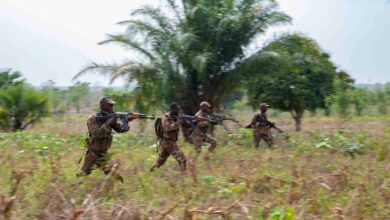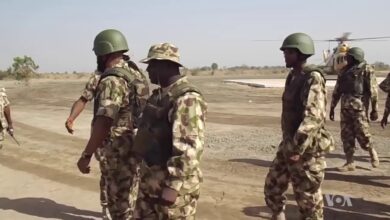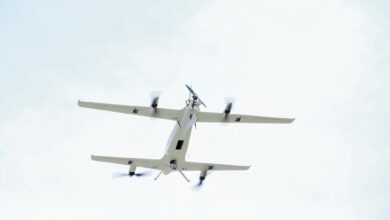Jihadists have killed at least 23 men in Nigeria’s northeast Borno state in the latest violence to hit the conflict-ridden region, militia sources said Thursday.
Fighters from the Islamic State West Africa Province (ISWAP) seized the men on Tuesday as they searched for scrap metal as part of a 50-strong group in the Magdala village in the Dikwa district, they said.
The incident was reported only on Thursday because telecom towers destroyed by jihadists have slowed communication in the area.
“For now 23 bodies have been recovered and they were all slaughtered by the terrorists,” militia leader Babakura Kolo told AFP.
“Three people made it back to Dikwa while the fate of the remaining 24 is still unknown,” he said.
There were fears that the missing men had been taken hostage by the militants, said another militiaman Ibrahim Liman.
He said search teams were combing the bushes as the missing men “could have been shot dead while trying to flee”.
Nigerian military has recently intensified ground and air attacks against ISWAP and rival Boko Haram and said it had killed several high-profile commanders.
This week’s killings could have been revenge, as the jihadists accuse metal scavengers of passing information on their positions to the military, the militiamen said.
Last month, 30 metal scavengers in Mudu village in the same district were killed by jihadists.
ISWAP split from mainstream Boko Haram in 2016.
The two groups have increasingly been targeting civilians, particularly loggers, farmers, and herders, accusing them of spying on them for the military and the local militias fighting them.
The jihadist violence has killed over 40,000 people and displaced around two million from their homes in the northeast since 2009, according to the UN.
Most of the displaced live in camps and rely on food rations from aid agencies, which forces many of them to fell trees for firewood and scavenge for metal scraps, which they then sell to buy food.
Local authorities have been returning the displaced back to their homes despite concerns about their safety by aid agencies.
The violence had spread to neighboring Niger, Chad, and Cameroon, leading to the formation of a regional military coalition to fight the insurgents.












